Marek Cygan
NoMagic.AI, Institute of Informatics, University of Warsaw
Debate2Create: Robot Co-design via Large Language Model Debates
Oct 29, 2025Abstract:Automating the co-design of a robot's morphology and control is a long-standing challenge due to the vast design space and the tight coupling between body and behavior. We introduce Debate2Create (D2C), a framework in which large language model (LLM) agents engage in a structured dialectical debate to jointly optimize a robot's design and its reward function. In each round, a design agent proposes targeted morphological modifications, and a control agent devises a reward function tailored to exploit the new design. A panel of pluralistic judges then evaluates the design-control pair in simulation and provides feedback that guides the next round of debate. Through iterative debates, the agents progressively refine their proposals, producing increasingly effective robot designs. Notably, D2C yields diverse and specialized morphologies despite no explicit diversity objective. On a quadruped locomotion benchmark, D2C discovers designs that travel 73% farther than the default, demonstrating that structured LLM-based debate can serve as a powerful mechanism for emergent robot co-design. Our results suggest that multi-agent debate, when coupled with physics-grounded feedback, is a promising new paradigm for automated robot design.
Bigger, Regularized, Categorical: High-Capacity Value Functions are Efficient Multi-Task Learners
May 29, 2025Abstract:Recent advances in language modeling and vision stem from training large models on diverse, multi-task data. This paradigm has had limited impact in value-based reinforcement learning (RL), where improvements are often driven by small models trained in a single-task context. This is because in multi-task RL sparse rewards and gradient conflicts make optimization of temporal difference brittle. Practical workflows for generalist policies therefore avoid online training, instead cloning expert trajectories or distilling collections of single-task policies into one agent. In this work, we show that the use of high-capacity value models trained via cross-entropy and conditioned on learnable task embeddings addresses the problem of task interference in online RL, allowing for robust and scalable multi-task training. We test our approach on 7 multi-task benchmarks with over 280 unique tasks, spanning high degree-of-freedom humanoid control and discrete vision-based RL. We find that, despite its simplicity, the proposed approach leads to state-of-the-art single and multi-task performance, as well as sample-efficient transfer to new tasks.
Joint MoE Scaling Laws: Mixture of Experts Can Be Memory Efficient
Feb 07, 2025



Abstract:Mixture of Experts (MoE) architectures have significantly increased computational efficiency in both research and real-world applications of large-scale machine learning models. However, their scalability and efficiency under memory constraints remain relatively underexplored. In this work, we present joint scaling laws for dense and MoE models, incorporating key factors such as the number of active parameters, dataset size, and the number of experts. Our findings provide a principled framework for selecting the optimal MoE configuration under fixed memory and compute budgets. Surprisingly, we show that MoE models can be more memory-efficient than dense models, contradicting conventional wisdom. To derive and validate the theoretical predictions of our scaling laws, we conduct over 280 experiments with up to 2.7B active parameters and up to 5B total parameters. These results offer actionable insights for designing and deploying MoE models in practical large-scale training scenarios.
RoboMorph: Evolving Robot Morphology using Large Language Models
Jul 11, 2024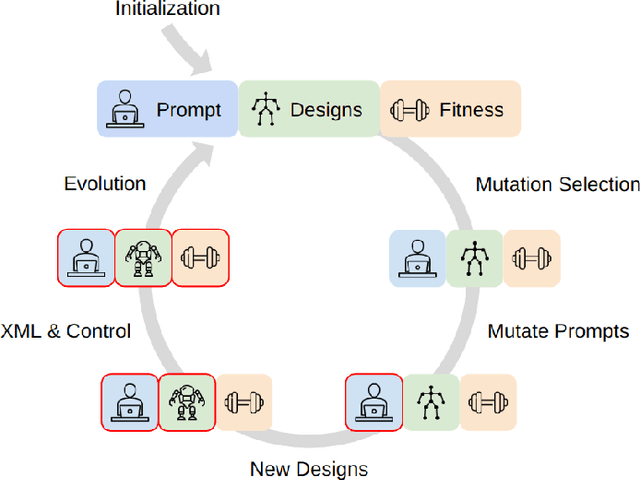
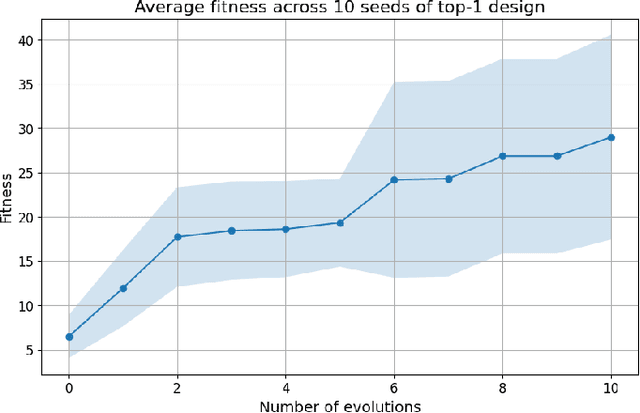
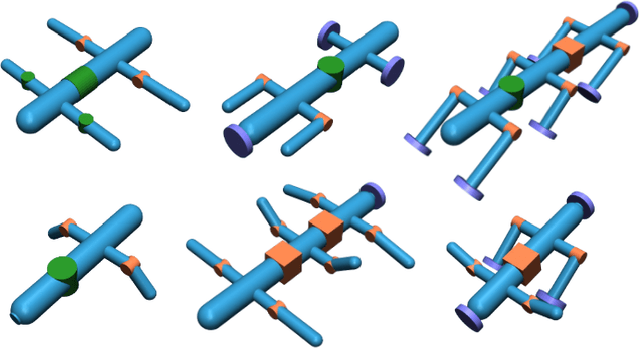
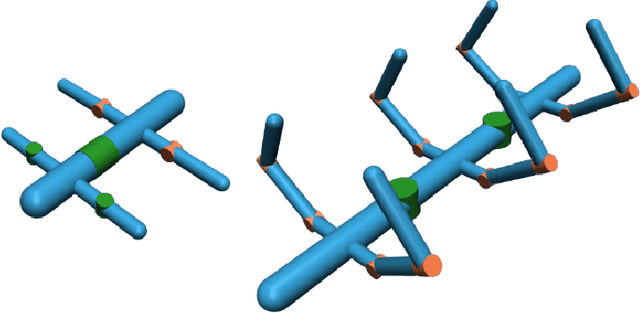
Abstract:We introduce RoboMorph, an automated approach for generating and optimizing modular robot designs using large language models (LLMs) and evolutionary algorithms. In this framework, we represent each robot design as a grammar and leverage the capabilities of LLMs to navigate the extensive robot design space, which is traditionally time-consuming and computationally demanding. By integrating automatic prompt design and a reinforcement learning based control algorithm, RoboMorph iteratively improves robot designs through feedback loops. Our experimental results demonstrate that RoboMorph can successfully generate nontrivial robots that are optimized for a single terrain while showcasing improvements in morphology over successive evolutions. Our approach demonstrates the potential of using LLMs for data-driven and modular robot design, providing a promising methodology that can be extended to other domains with similar design frameworks.
Bigger, Regularized, Optimistic: scaling for compute and sample-efficient continuous control
May 25, 2024



Abstract:Sample efficiency in Reinforcement Learning (RL) has traditionally been driven by algorithmic enhancements. In this work, we demonstrate that scaling can also lead to substantial improvements. We conduct a thorough investigation into the interplay of scaling model capacity and domain-specific RL enhancements. These empirical findings inform the design choices underlying our proposed BRO (Bigger, Regularized, Optimistic) algorithm. The key innovation behind BRO is that strong regularization allows for effective scaling of the critic networks, which, paired with optimistic exploration, leads to superior performance. BRO achieves state-of-the-art results, significantly outperforming the leading model-based and model-free algorithms across 40 complex tasks from the DeepMind Control, MetaWorld, and MyoSuite benchmarks. BRO is the first model-free algorithm to achieve near-optimal policies in the notoriously challenging Dog and Humanoid tasks.
Overestimation, Overfitting, and Plasticity in Actor-Critic: the Bitter Lesson of Reinforcement Learning
Mar 01, 2024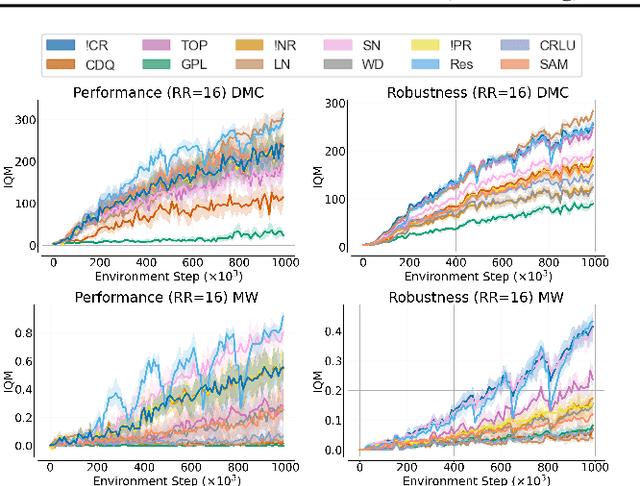
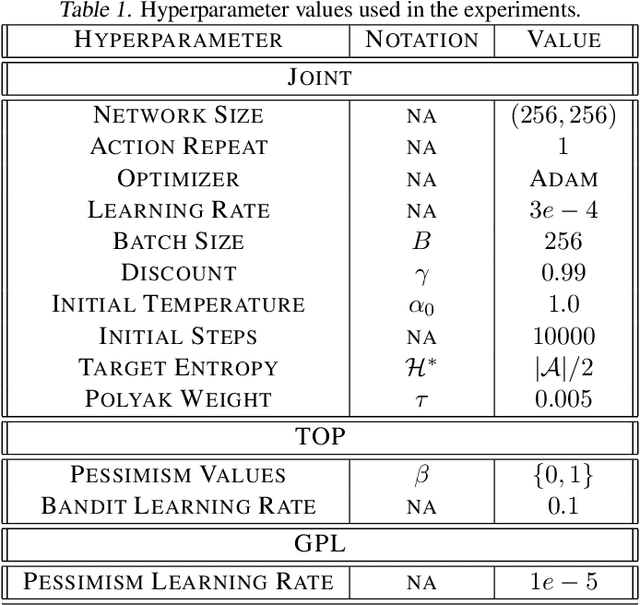

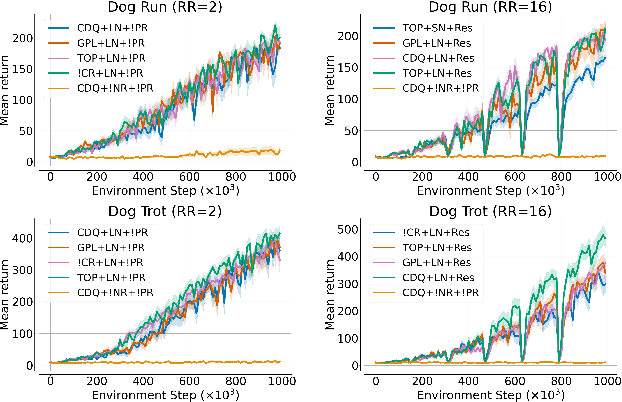
Abstract:Recent advancements in off-policy Reinforcement Learning (RL) have significantly improved sample efficiency, primarily due to the incorporation of various forms of regularization that enable more gradient update steps than traditional agents. However, many of these techniques have been tested in limited settings, often on tasks from single simulation benchmarks and against well-known algorithms rather than a range of regularization approaches. This limits our understanding of the specific mechanisms driving RL improvements. To address this, we implemented over 60 different off-policy agents, each integrating established regularization techniques from recent state-of-the-art algorithms. We tested these agents across 14 diverse tasks from 2 simulation benchmarks. Our findings reveal that while the effectiveness of a specific regularization setup varies with the task, certain combinations consistently demonstrate robust and superior performance. Notably, a simple Soft Actor-Critic agent, appropriately regularized, reliably solves dog tasks, which were previously solved mainly through model-based approaches.
A Case for Validation Buffer in Pessimistic Actor-Critic
Mar 01, 2024



Abstract:In this paper, we investigate the issue of error accumulation in critic networks updated via pessimistic temporal difference objectives. We show that the critic approximation error can be approximated via a recursive fixed-point model similar to that of the Bellman value. We use such recursive definition to retrieve the conditions under which the pessimistic critic is unbiased. Building on these insights, we propose Validation Pessimism Learning (VPL) algorithm. VPL uses a small validation buffer to adjust the levels of pessimism throughout the agent training, with the pessimism set such that the approximation error of the critic targets is minimized. We investigate the proposed approach on a variety of locomotion and manipulation tasks and report improvements in sample efficiency and performance.
Scaling Laws for Fine-Grained Mixture of Experts
Feb 12, 2024



Abstract:Mixture of Experts (MoE) models have emerged as a primary solution for reducing the computational cost of Large Language Models. In this work, we analyze their scaling properties, incorporating an expanded range of variables. Specifically, we introduce a new hyperparameter, granularity, whose adjustment enables precise control over the size of the experts. Building on this, we establish scaling laws for fine-grained MoE, taking into account the number of training tokens, model size, and granularity. Leveraging these laws, we derive the optimal training configuration for a given computational budget. Our findings not only show that MoE models consistently outperform dense Transformers but also highlight that the efficiency gap between dense and MoE models widens as we scale up the model size and training budget. Furthermore, we demonstrate that the common practice of setting the size of experts in MoE to mirror the feed-forward layer is not optimal at almost any computational budget.
Decoupled Actor-Critic
Oct 30, 2023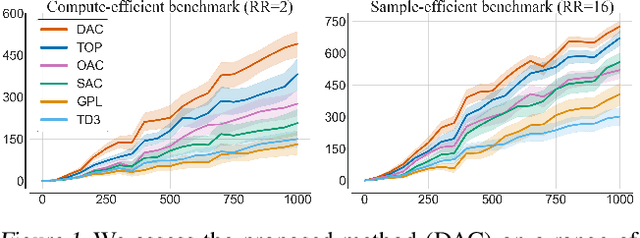
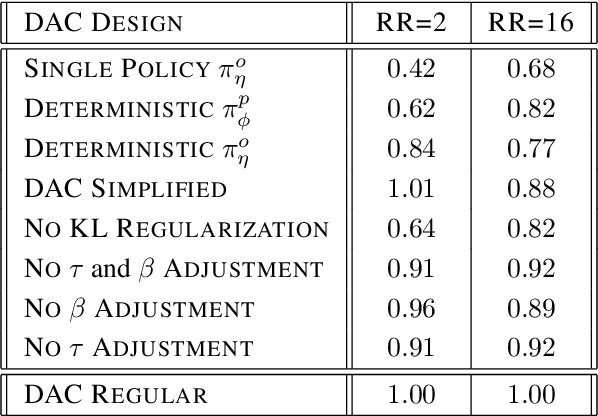

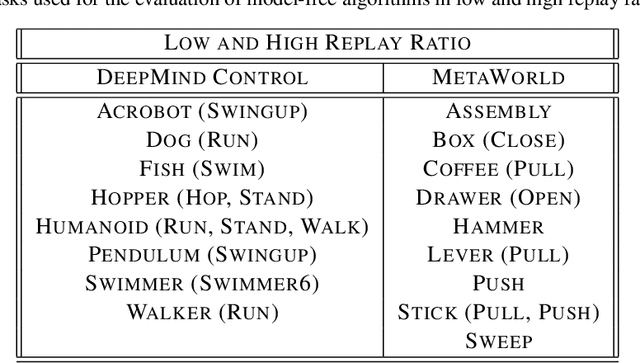
Abstract:Actor-Critic methods are in a stalemate of two seemingly irreconcilable problems. Firstly, critic proneness towards overestimation requires sampling temporal-difference targets from a conservative policy optimized using lower-bound Q-values. Secondly, well-known results show that policies that are optimistic in the face of uncertainty yield lower regret levels. To remedy this dichotomy, we propose Decoupled Actor-Critic (DAC). DAC is an off-policy algorithm that learns two distinct actors by gradient backpropagation: a conservative actor used for temporal-difference learning and an optimistic actor used for exploration. We test DAC on DeepMind Control tasks in low and high replay ratio regimes and ablate multiple design choices. Despite minimal computational overhead, DAC achieves state-of-the-art performance and sample efficiency on locomotion tasks.
Mixture of Tokens: Efficient LLMs through Cross-Example Aggregation
Oct 24, 2023Abstract:Despite the promise of Mixture of Experts (MoE) models in increasing parameter counts of Transformer models while maintaining training and inference costs, their application carries notable drawbacks. The key strategy of these models is to, for each processed token, activate at most a few experts - subsets of an extensive feed-forward layer. But this approach is not without its challenges. The operation of matching experts and tokens is discrete, which makes MoE models prone to issues like training instability and uneven expert utilization. Existing techniques designed to address these concerns, such as auxiliary losses or balance-aware matching, result either in lower model performance or are more difficult to train. In response to these issues, we propose Mixture of Tokens, a fully-differentiable model that retains the benefits of MoE architectures while avoiding the aforementioned difficulties. Rather than routing tokens to experts, this approach mixes tokens from different examples prior to feeding them to experts, enabling the model to learn from all token-expert combinations. Importantly, this mixing can be disabled to avoid mixing of different sequences during inference. Crucially, this method is fully compatible with both masked and causal Large Language Model training and inference.
 Add to Chrome
Add to Chrome Add to Firefox
Add to Firefox Add to Edge
Add to Edge